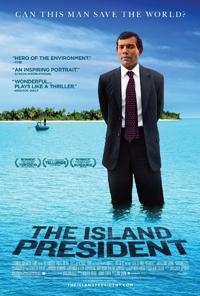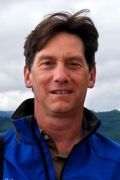
Community Cinema ~ The Island President with INSTARR Director James White
- Library Hall
A free screening of the PBS Independent Lens documentary The Island President, a film by Jon Shenk, Bonni Cohen, and Richard Berge, with a discussion led by Prof. James White, director of the Institute for Arctic and Alpine Research.
ABOUT THE FILM
The Island President lifts the issue of global warming out of the theoretical and into the personal. President Mohamed Nasheed is trying to prevent 385,000 people from drowning. His nation of 1,200 low-lying islands, the Maldives, is sinking into the Indian Ocean as sea levels rise due to global warming. Climate change experts say that some of the islands will be submerged within 20 years, threatening the lives of the largely impoverished inhabitants as well as inundating the lavish resorts that dot the islands. Nasheed’s unprecedented contingency plan is to move his entire population to a new homeland. As he conducts serious discussions about this with Sri Lanka and Australia, Nasheed is doing all he can to prevent this looming disaster by trying to convince world leaders to halt global warming.
The Island President is a little like a non-fiction Mr. Smith Goes to Washington elevated to the world stage. The filmmakers received exclusive access to follow President Nasheed as he prepared over several months for the 2009 Copenhagen Climate Summit in December. The terms of the 1997 Kyoto Treaty on Climate Change were about to expire, and leaders from around the world converged on Copenhagen to hammer out a new treaty with renewed urgency. Go behind the scenes with President Nasheed as he tries to convince world leaders to finally take serious action against looming danger of climate change. The stakes couldn’t be higher for President Nasheed, who this as the last chance to save his homeland, and the world.
About the speaker: James White, Director of INSTAAR
Dr. James White's research interests are broad, but all revolve around the use of environmental stable isotope ratios. He operates and maintains a laboratory for the analysis of stable isotope ratios of carbon, hydrogen, nitrogen, oxygen and sulfur (instaar.colorado.edu/sil).
His specific areas of research include modeling the global carbon cycle using isotope ratios in atmospheric carbon dioxide and methane, development of techniques for measuring isotope ratios in atmospheric gases, reconstructions of paleo-environmental conditions using isotopes in ice cores, reconstructions of past environments from isotopes in organic materials, and tracing of ground water flow and recharge. He has been a member of several deep ice coring projects in Greenland (GISP2, NorthGRIP, and NEEM) and Antarctica (Siple Dome and Inland WAIS).
He is also an affiliate of NOAA and works closely with the Carbon Cycle Group there. Since the late 1980’s, his ice core research has helped to show that large climate changes tend to occur in the natural system as abrupt and rapid shifts in mode probably driven by internal adjustments in the Earth climate system, rather than slow and gradual adjustments to changing external conditions, such as the amount of energy received from the sun. Shifts of more than 10˚C in mean temperature in less than a human lifetime are common in the paleoclimate record, and serve as a warning that adaptation to future climate changes may not be easy. His research in isotopes in the carbon cycle has also helped to show that land plants are capable of removing large amounts of carbon dioxide from the atmosphere, amounts that equal our input of CO2 from fossil fuel burning on short time scales. Such large changes in the uptake of CO2 by plants is a key piece in the puzzle we must solve to formulate workable policy on CO2 levels and climate change.
About INSTAAR
Scientists at the Institute of Arctic and Alpine Research (INSTAAR), part of the University of Colorado Boulder, discover the mechanisms that drive environmental change. They conduct interdisciplinary research on physical and biogeochemical processes in ancient and modern environments. Topics include geochronology, ecology, hydrology, oceanography, landscape evolution, and climate. INSTAAR field sites are located on all seven continents and the world’s oceans. INSTAAR leads in key measures of scientific impact, such as numbers of papers, citations, and research dollars—more than 5,400 scientific papers cited INSTAAR research last year. INSTAAR shares its findings with the public to heighten understanding of environmental and climate change.
ABOUT COMMUNITY CINEMA
Community Cinema is a groundbreaking public education and civic engagement initiative featuring free monthly screenings of films from the Emmy Award-winning series Independent Lens and other PBS presentations. Community Cinema is on location in more than 95 cities nationally, bringing together leading organizations, community members, and public television stations to learn, discuss, and get involved in key social issues of our time.
ABOUT ITVS
The Independent Television Service funds, presents, and promotes award-winning documentaries and dramas on public television, innovative new media projects on the Web, and the Emmy® Award-winning weekly series Independent Lens on Monday nights at 10:00 PM on PBS. Mandated by Congress in 1988 and funded by the Corporation for Public Broadcasting, ITVS has brought more than one thousand independently produced programs to date to American audiences. www.itvs.org
Made possible by a partnership with Rocky Mountain PBS.















